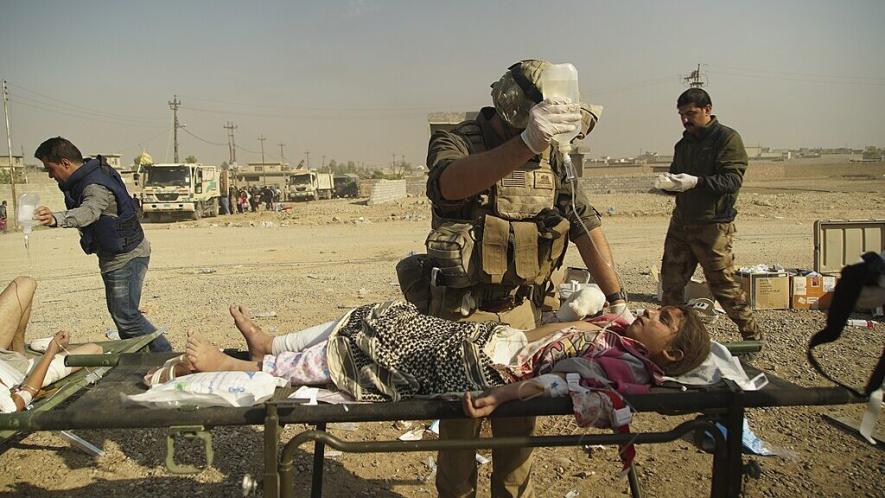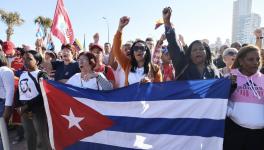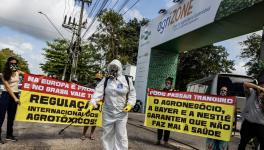Every Year, Sanctions Kill More People Than Wars

Source: Mstyslav Chernov/Wikimedia Commons
Between 2010 and 2021, unilateral sanctions caused an estimated 564,258 deaths each year – more than five times the number of people killed annually in direct armed combat. This warning comes from a new report published in The Lancet, which contextualizes decades of data on how sanctions affect mortality.
“From a rights-based perspective, evidence that sanctions lead to losses in lives should be sufficient reason to advocate for the suspension of their use,” the study’s authors argue. But that is far from reality. Over the same decade, nearly a quarter of all of the world’s countries were affected by sanctions, driven primarily by a sharp increase in unilateral economic measures imposed by the United States and its European allies.
While Western sanctions “have the claimed aim to end wars, protect human rights, or promote democracy,” the report shows they do the very opposite. By restricting a country’s ability to import essential goods like food, medicine, and medical supplies, and by slashing public budgets, sanctions systematically undermine healthcare systems and other vital services.
“The unilateral coercive measures imposed on Venezuela have taken a devastating toll on most of the population, constituting an act of collective punishment and thus a crime against humanity,” Carlos Ron, former Vice Minister of Foreign Affairs for North America, told Peoples Health Dispatch. “We could never know exactly how many lives could have been saved had it not been for these measures – state-led, partially or fully subsidized programs that distributed medicine for chronic illnesses, including HIV and cancer treatment, were affected.”
The COVID-19 pandemic brought this dynamic into even harsher focus. Countries like Iran and Venezuela struggled to import critical supplies, including testing kits, vaccine materials, and vaccines themselves.
“Vaccination campaigns were disrupted by the inability to obtain specific components, increasing health risks for children in situations that could have been entirely preventable,” Ron noted. “The most notable and outrageous case was that of COVID-19 vaccines, which Venezuela was not allowed to purchase using public funds held in its illegally frozen foreign accounts. At the onset of the pandemic, Venezuela could have easily bought all the vaccines needed for its entire population from these accounts, some of which remain frozen to this day.”
All economic sanctions are sanctions on health
“All economic sanctions ultimately function as sanctions on health,” adds the editorial in the same issue of The Lancet. This means they fuel illness and death, especially among the most vulnerable population groups, like children and the elderly.
“Deaths of children younger than 5 years represented 51% of total deaths caused by sanctions over the 1970-2021 period,” the authors of the study warned. These deaths are associated with slow, avoidable deterioration – lack of food, medicine, and functioning health services. Deterioration associated with sanctions accumulates and expands over time, so the longer these measures are implemented, the more harm they do.
A tool of US imperialism
Nowadays, the overwhelming majority of sanctions are imposed unilaterally (and illegally), without the approval of the UN, by the US and European countries. According to the report, it is precisely this type of sanction – particularly when imposed by the US – that has the greatest impact on mortality.
On the other hand, sanctions of any kind are rarely imposed on US allies, no matter how serious their actions. The report suggests: “They [the US and Europe] are unlikely to be inclined to sanction their own allies; if they do so, it will be when a great deal of consensus has emerged that the target country has done something egregious enough so as to merit multilateral condemnation, in which case sanctions will also be imposed by the UN and by definition not be unilateral.”
Apparently, some of these allies won’t face sanctions even if they commit the most serious of crimes. The most glaring example of this is Israel. Despite its ongoing genocide in Gaza – where at least 60,000 people have been killed and dozens are murdered in aid lines every day – Israel faces no Western sanctions. In contrast, Cuba, Venezuela, and Iran continue to be heavily sanctioned, while the EU routinely expands financial measures against the Russian Federation.
Back in 2005, the People’s Health Movement warned that war threatens not only health but the very fabric of society. In the first edition of Global Health Watch, its authors wrote that war “has an enormous and tragic impact on people’s lives,” contributing to more death and disability than many major diseases. The new Lancet report comes as a reminder that the same is true for sanctions.
People’s Health Dispatch is a fortnightly bulletin published by the People’s Health Movement and Peoples Dispatch. For more articles and to subscribe to People’s Health Dispatch, click here.
Courtesy: Peoples Dispatch
Get the latest reports & analysis with people's perspective on Protests, movements & deep analytical videos, discussions of the current affairs in your Telegram app. Subscribe to NewsClick's Telegram channel & get Real-Time updates on stories, as they get published on our website.
























